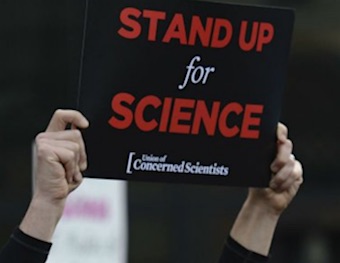The Union of Concerned Scientists rapped the world of “alternative facts” promoted by the President and his allies and called on journalists to hold the White House and Congress accountable for actions that “threaten scientific integrity and science-based policies,” in its report on Donald Trump’s six months in office.
While all modern presidents have politicized science to some extent, USC says the Trump Administration has increased the number of threats to federal scientists.
 |
“The Administration has shown a blatant disregard for scientific facts and evidence, appointing officials with a track record of misrepresenting scientific information, overruling the recommendations of scientists on exposure to toxic pesticides, removing scientific information from agency websites and dismissing independent science advisors,” according to the 35-page “Sidelining Science from Day One” report.
UCS accuses the Trump Administration of creating a chilling environment for government scientists who are afraid to speak certain words such as “climate change.”
For instance, the Centers for Disease Control’s cancellation of “The Climate and Health Summit” that was slated for February led many to fear a future of self-sabotage or self-censorship within federal agencies to avoid conflict from Trump political appointees.
UCS calls on journalists to continue their mission of holding officials accountable for the Administration’s words and actions and to investigate allegations of wrongdoing.
The role of journalism is to seek out truth and objectively report on it when the Trump Administration, “including the President, willingly disregards facts, misrepresents scientific conclusions, plays up uncertainty, vilifies scientists, and otherwise distorts public perceptions of science.”
Journalists must also call out “agencies that place unnecessary barriers on communication between the media and government scientists.”
Science and technology will be instrumental in dealing with the complex challenges facing the US.
“The public deserves independent impartial scientific information, even—or perhaps especially—when that information indicates the need for politically unpopular or inconvenient action,” says the report.


 Southern governors claim they know what's best for their working class, and it's not pay raises... A Ukrainian human rights group played a key role in convincing House Speaker Mike Johnson to hold a vote to send arms to Ukraine, Israel and Taiwan... Trump Media & Technology Group blames short-selling and not lousy outlook for its stock slump.
Southern governors claim they know what's best for their working class, and it's not pay raises... A Ukrainian human rights group played a key role in convincing House Speaker Mike Johnson to hold a vote to send arms to Ukraine, Israel and Taiwan... Trump Media & Technology Group blames short-selling and not lousy outlook for its stock slump. The techniques deployed by OJ Simpson's defense team in the 'trial of the century' served as a harbinger for those used by Donald Trump... People worry about the politicization of medical science just as much as they fret about another pandemic, according to Edelman Trust Barometer... Book bans aren't restricted to red states as deep blue Illinois, Connecticut and Maryland challenged at least 100 titles in 2023.
The techniques deployed by OJ Simpson's defense team in the 'trial of the century' served as a harbinger for those used by Donald Trump... People worry about the politicization of medical science just as much as they fret about another pandemic, according to Edelman Trust Barometer... Book bans aren't restricted to red states as deep blue Illinois, Connecticut and Maryland challenged at least 100 titles in 2023. The NBA, which promotes legalized gambling 24/7, seems more than hypocritical for banning player for placing bets... Diocese of Brooklyn promises to issue press release the next time one of its priests is charged with sexual abuse... Truth Social aspires to be one of Donald Trump's iconic American brands, just like Trump University or Trump Steaks or Trump Ice Cubes.
The NBA, which promotes legalized gambling 24/7, seems more than hypocritical for banning player for placing bets... Diocese of Brooklyn promises to issue press release the next time one of its priests is charged with sexual abuse... Truth Social aspires to be one of Donald Trump's iconic American brands, just like Trump University or Trump Steaks or Trump Ice Cubes. Publicis Groupe CEO Arthur Sadoun puts competition on notice... Macy's throws in the towel as it appoints two directors nominated by its unwanted suitor... The Profile in Wimpery Award goes to the Ford Presidential Foundation for stiffing American hero and former Wyoming Congresswoman Liz Cheney.
Publicis Groupe CEO Arthur Sadoun puts competition on notice... Macy's throws in the towel as it appoints two directors nominated by its unwanted suitor... The Profile in Wimpery Award goes to the Ford Presidential Foundation for stiffing American hero and former Wyoming Congresswoman Liz Cheney. JPMorgan Chase chief Jamie Dimon's "letter to shareholders" is a must-read for PR people and others interested in fixing America and living up to its potential... Get ready for the PPE shortage when the next pandemic hits... Nixing Netanyahu. Gaza carnage turns US opinion against Israel's prime minister.
JPMorgan Chase chief Jamie Dimon's "letter to shareholders" is a must-read for PR people and others interested in fixing America and living up to its potential... Get ready for the PPE shortage when the next pandemic hits... Nixing Netanyahu. Gaza carnage turns US opinion against Israel's prime minister.


 Have a comment? Send it to
Have a comment? Send it to 
No comments have been submitted for this story yet.